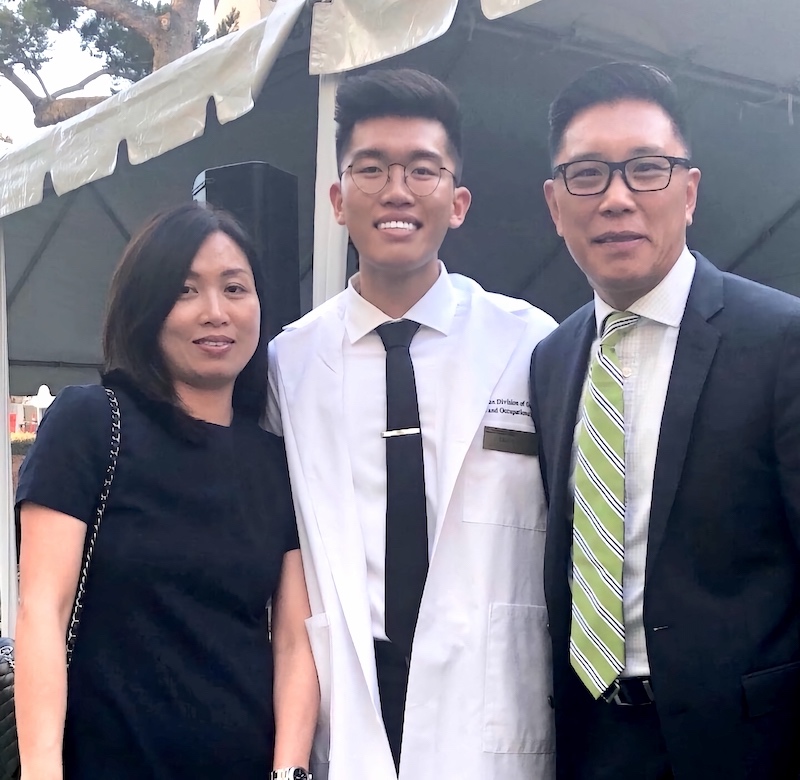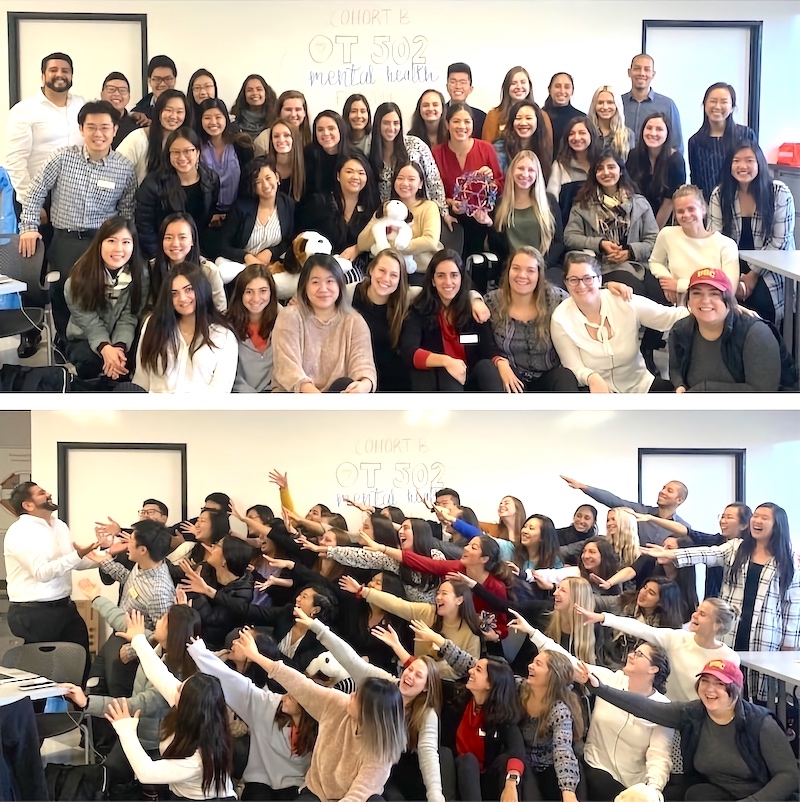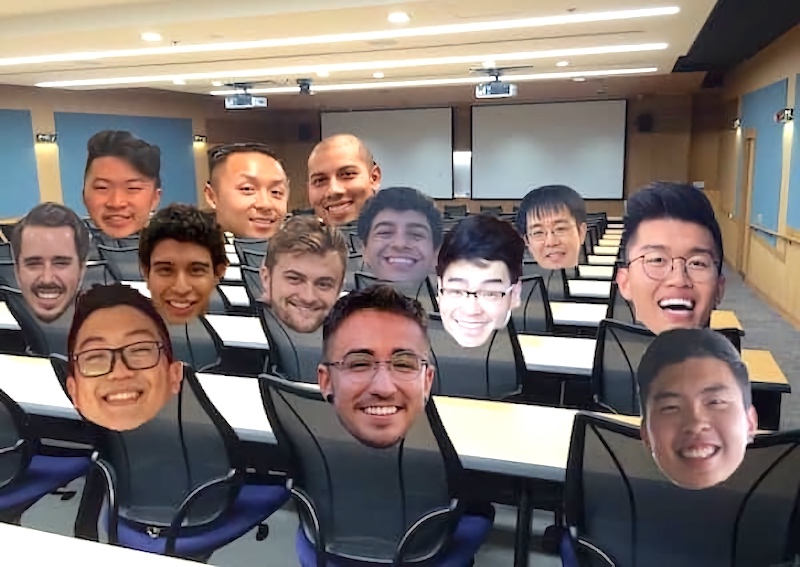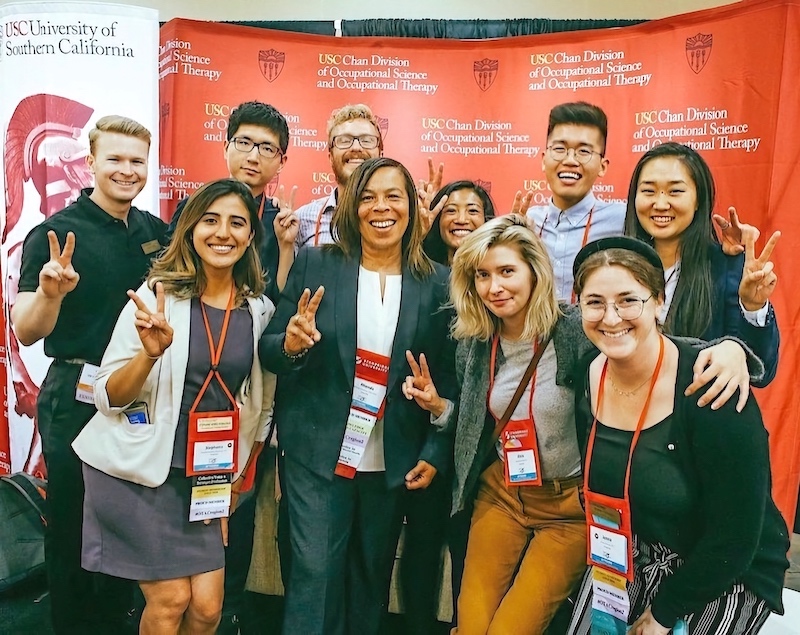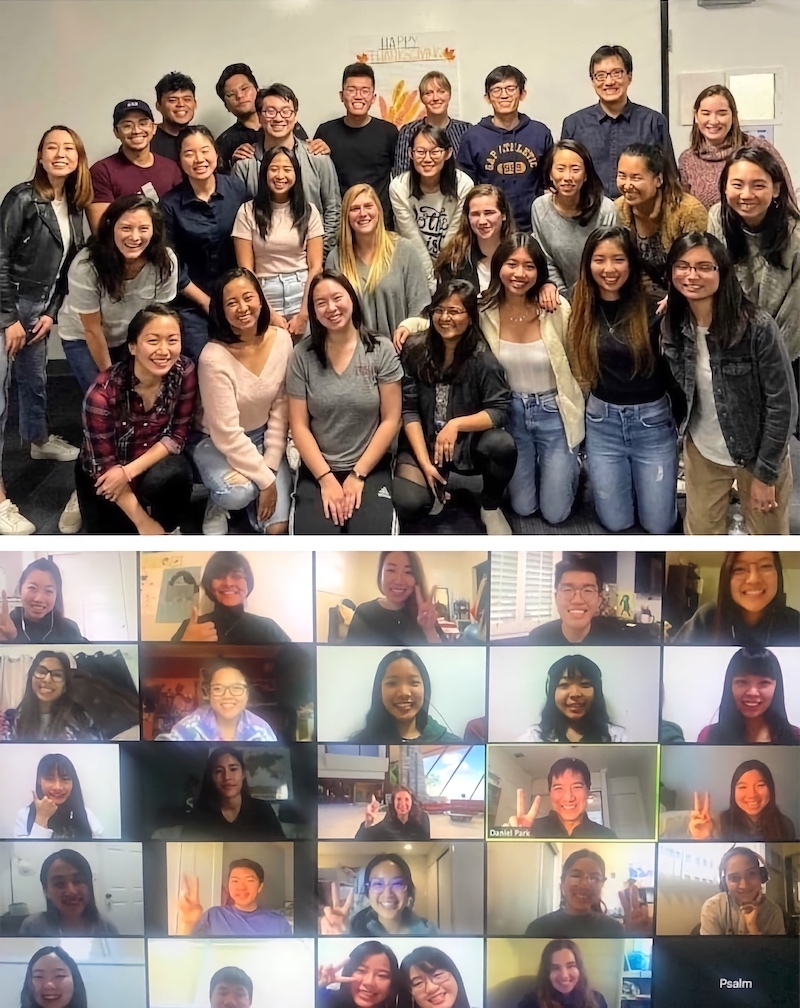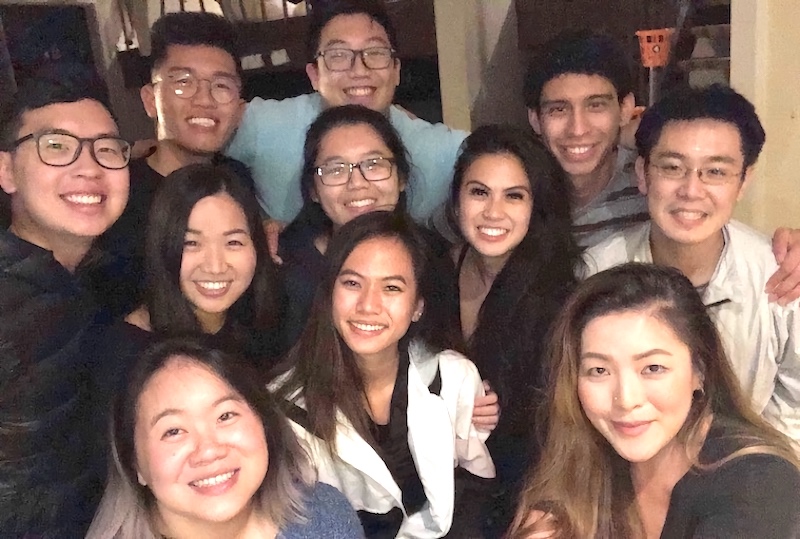Student Blog
What are OS/OT?
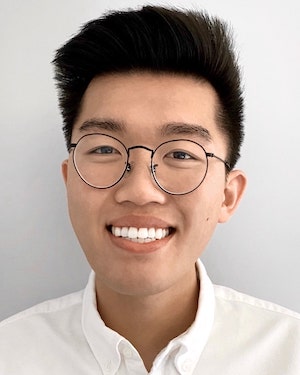
New Occupation, Who This? ⟩
August 18, 2020, by Calvin
Classes Videos What are OS/OT?
The bittersweet summer semester is over! This was my first full semester online and honestly after I hit the “submit” button on my last final exam, I was so relieved and just felt so much freer. Thankfully, we all get one week off to destress before getting back on the grind for the fall.
Something I really wanted to do during the break was tie-dye, and I know what you’re thinking: “that’s so random . . . what does that have to do with anything?” Well, in the OT 534: Health Promotion and Wellness course, Dr. Laura Cox and Dr. Kelcie Kadowaki (both on the Faculty Practice Team) gave us a class day to practice self-care and mindfulness by offering various “Wellness Workshops”. I joined the “Tie-Dye” group because I had never done it before and it seemed really fun! It was so nice to step away from lectures to loosen up, and it reminded me that sometimes I just need to breathe and be in the present. I echo the sentiments of Bethany, Lamoni and Savi’s blog posts about remembering to be good to ourselves, to do what we can, and that it’s okay to give ourselves the time and space we need. I hope that this video can serve as a reminder to practice self-care and also just give you a good laugh! Stick around until the end of the vlog for a very special clip! (Spoiler Alert: Liz makes a colorful guest appearance!)
⋯

Flashback To My First Year ⟩
July 24, 2020, by Calvin
Beginnings and Endings Community What are OS/OT?
I remember walking onto the Health Sciences Campus on my first day and being really nervous about how I was going to meet new people. I remember I was almost late because I underestimated traffic, but I ended up making it even though I was dripping in panic sweat haha . . . I remember the insane amount of times when we would all introduce ourselves because there were just so many people to meet! I remember taking classes in the G-37 Auditorium, a.k.a. the frozen tundra in the CHP building, where I could always rely on the A.C. to be blasting. I remember how accomplished we all felt when we finished up our first summer semester. I remember starting my first immersion in mental health, engaging in my first Level I Fieldwork, and just spending good times with friends in the program! I remember it all!
Okay, Calvin, we get it; you remember stuff! What’s your point? Well, in just one year, I was able to experience and learn so much about the profession, myself, others, and beyond. However, I would have never guessed that we would all be where we are right now. It’s been a relatively challenging past few months with everything going on, but reflecting on the past year has really helped me stay motivated. These memories remind me why I’m here, and I’d like to take you all on a trip down memory lane to share some with you!
The ones who make every impossible in my life, possible: my parents. They’ve always supported me in every endeavor and I’m forever grateful for them! Big love to my #1 fans!
Top: Us acting natural! | Bottom: Us reaching towards Dr. Celso Delgado Jr. because these were our last few weeks with him in the mental health immersion 😢.
The best cohort, Cohort B(EST)!!! Sorry, I don’t make the rules ¯\_( ˘ ˘̯)_/¯.Huge shoutout to this phenomenal group of individuals! They are truly some of the most inspiring, funny, genuine, and authentic people I’ve ever met!
Just some BrOT Master’s students ~chilling out~ in the G-37 Auditorium! Photo credits: Christopher Chu MA ‘21.
All I can say is that I love this picture and this group of people LOL! By the way, you can actually see more of the division, virtually, thanks to the USC SMART-VR Virtual Reality Tour App that was co-created by Dr. Sook-Lei Liew!
This was taken at the 2019 Occupational Therapy Association of California (OTAC) Annual Conference. This was my first OT conference ever and it was such a great time connecting with others, attending a variety of presentations, and just being surrounded by so many OT leaders!
Top: Global Initiatives Thanksgiving Dinner with BS-MA students, MA-1 students, MA-2 students, OTD students, and faculty. | Bottom: A virtual Zoom meeting between the USC Chan community and students from Kaohsiung Medical University in Taiwan.
The Global Initiatives Team has always been so welcoming and they’ve provided multiple opportunities to learn and have dialogue about a variety of international topics. I’m incredibly thankful to Global Initiatives for fostering such a vibrant community and for making my first year experience an unforgettable one!
I hope that this gave you all a good glimpse into what my first year in the program was like. Life is very different right now, but that shouldn’t stop us from making new and lasting memories!
⋯
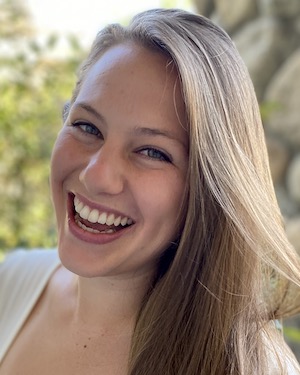
When a Planner’s Plan Doesn’t go to Plan ⟩
July 21, 2020, by Savi
Fieldwork What are OS/OT?
You never know where you are going to end up. This was a comment I heard from a lot of USC faculty and staff during my first summer in the Master’s program. I would chuckle and dismiss these comments because I have always known what setting I wanted to work in as an occupational therapist (OT). When I have a plan I rarely sway from it. After deciding to pursue a career as an OT in acute care during my junior year of high school, I did everything I could to fulfill this dream of mine.
Upon entering into my first immersion, mental health, I had already convinced myself that this was not the field I was going to work in. As I attended more classes, participated in group discussions, and immersed myself in an eye-opening fieldwork placement, I soon came to realize that my plan to pursue a career in acute care may not be my goal after all. In this fieldwork setting I listened to my clients’ stories and worked with them to overcome the mental health barriers they faced to become better mothers. This experience made me realize that my love for working with clients to improve both mental and physical health in order to engage in meaningful occupations can be applied in a variety of settings. For the first time in a while, I was confused about where I was going to end up, and that made me feel uneasy.
It was not until I was introduced to my faculty mentor, Kimberly Perring Lenington, that I came to terms with the fact that my confusion was a good thing and not something to be afraid of. I instantly admired Dr. Lenington for achieving my original goal of working in the acute care setting directly after graduating from USC. I remember asking Dr. Lenington if this was her goal all along and recall her explaining that this was not her plan. She fell into this setting and loves it. I was shocked. I didn’t have to plan my entire career from high school in order to be successful in my field of choice?
While learning more about Dr. Lenington I discovered a niche specialty I was never aware of. Dr. Lenington also treats individuals with various pelvic health diagnoses including incontinence, pelvic pain, and sexual dysfunction. After diving deeper into this pelvic health specialty and learning more about OT’s role in sexual health in my OT 534 Health Promotion and Wellness course, I became fascinated by the opportunity to work with women to help them holistically. In this setting, I could tackle the mental and physical barriers to achieving pelvic health in order to help women participate in meaningful occupations. Let’s just say I was immediately hooked!
Although I am still passionate about the possibility of working in an acute care setting, I have come to the understanding that I must allow myself to keep an open mind. Without doing so I would have never discovered the pelvic health specialty that I am now extremely excited about. It is ok to be confused about where you want to be once you graduate. This confusion is truly a gift. Allowing yourself to keep an open mind, in turn, widens the realm of possibilities. So to those who are planners like me, know that it is all right to redo your plan. Keep your options open . . . you never know what opportunities could be coming your way!
⋯

Why Occupational Therapy? ⟩
June 2, 2020, by Savi
What are OS/OT?
From a young age, I have been passionate about a range of interests, including sports, graphic design, leadership, and academic pursuits. When applying to college, I had to focus on which activities would interest me most in a future career. Prioritizing a narrower set of interests was challenging for me since I enjoy exploring new experiences, applying my knowledge in novel ways, and having the opportunity to continuously challenge myself to develop innovative and creative approaches to a problem. These desires, coupled with my personal experiences interacting with occupational therapists in a variety of settings, influenced me to pursue a career in occupational therapy (OT).
After injuring both my thumbs playing as a goalie for my soccer team, I worked with an OT hand therapist during my rehabilitation process. This interaction highlighted to me the importance of creativity in an OT’s approach to designing a treatment plan. My OT worked with me to set goals and develop a treatment plan that best suited my occupational needs. This OT gave me anatomy lessons to help me better understand my injuries and demonstrated ingenuity when developing activities she knew would pique my interest and motivate me. This first hand (or thumb haha) experience taught me that pursuing a career in OT would allow me to continuously challenge myself by developing specialized treatment plans to meet the unique needs of each of my clients, and provide clients with autonomy during their rehabilitation journey.
A few years later, I watched my sister conduct fieldwork immersions while completing her Master’s in Occupational Therapy at USC, and was further convinced that pursuing this profession would allow me to continue to develop innovative approaches to overcome challenging problems in a variety of settings. I witnessed her ability to work with college students to build a foundation of sustainable and healthy routines using Lifestyle Redesign® in the USC Chan Division Faculty Practice, with adults recovering from a stroke, traumatic brain injury, spinal cord injury and amputations in an inpatient rehabilitation setting, and with children with varying abilities in a sensory integration pediatric practice.
I came to better understand the opportunity OTs have to work in diverse environments including mental health, adult rehabilitation or pediatric settings. By choosing a career in OT, I will be equipped with the skills to develop innovative approaches to address specific occupational needs of individuals across the lifespan. I decided to pursue this career to empower the individuals I work with to feel like they can conquer everyday, every task, and every meaningful occupation with confidence and increased independence.
⋯
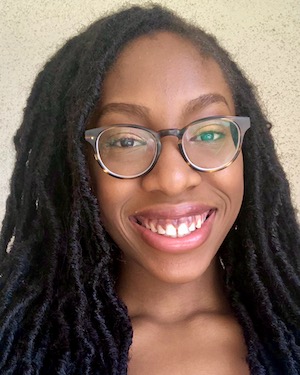
You’re Studying Occupational Therapy . . . huh? ⟩
June 1, 2020, by Nmachi
What are OS/OT?
As an Occupational Therapy major in the Bachelor’s to Master’s Program, I constantly get the same two questions asked by friends and family: What exactly is occupational therapy and how did you get into it? Since information about what occupational therapy can already be found on this site, I’ll just expand on why I chose to pursue OT.
From a young age, I have always been passionate about direct service and improving quality of life. Being a teacher, pediatrician, and physical therapist have been past career goals for me because each of them were rooted in helping others with their livelihood.
In high school, I began to narrow my interests down to what I actually could consider making a career out of. I came across the field of occupational therapy upon researching different academic programs at my top schools, browsing the USC website, and talking with my sister (an ‘SC alumna).
I became interested in OT because of the opportunity to provide the longitudinal patient interaction needed to help individuals reclaim their health. Because I cannot imagine losing the ability to perform seemingly simple everyday tasks, my desire is to be in a position to give others the hope of regaining their independence.
The day that I received my acceptance package and found out that I was going to be an Occupational Therapy major was probably the most exciting moment I’ve had thus far! Out of all of the universities I applied for during my senior year of high school, the only one that really stood out was USC. I knew that attending USC would completely prepare me for a career in OT (couldn’t pass up the #1 school for OT in the nation!).
With the countless resources that USC provides their students, I continue to look forward to building an educational foundation in OT and taking advantage of service experiences outside of the classroom to ultimately change my community for the better. I am more than ready to make my dreams a reality.
⋯






